Plot summary
Swimming coach Louis Connaught has entered his prize pupil Maria Santalucia in a women's swim meet in expectation of the usual victory; as Santalucia, born with webbed fingers, has an advantage over the other swimmers. Then his arch-rival coach Herbert Laird arrives, causing a strange commotion. When Connaught sees why he shouts a strenuous protest.
The story flashes back to the previous evening, when Herb has his friend, lawyer Mark Vining, over to his house. He has a plan to beat Louis Connaught and wants Mark along "to think up legal reasons why my scheme's okay." He introduces the lawyer to his protégé, Miss Iantha Delfoiros, a young woman in a wheelchair of strikingly exotic appearance. Mark is fascinated by Iantha, but she is evasive about her background. He learns only that she is from Cyprus and has surprising personal habits; for instance, she adds salt to her drinking water on the claim that fresh water makes her drunk, and eats all her food cold. Another layer of mystery is added when Herb asks Mark if he can legally accept gold coins hundreds of years old in exchange for ten thousand swimming caps; a deal supposedly proposed by Iantha. Increasingly concerned about this "crazy business" Mark demands to know what is going on before consenting to be party to it. Swearing him to secrecy, Herb and Iantha agree. Iantha pulls up the blanket covering her lower half to reveal a pair of horizontal flukes where her feet should be.
When the next day they enter Iantha in the swim meet, Connaught is naturally outraged to discover his star pupil will be going up against a mermaid. He raises every objection he can think of, only to be countered by Mark, who calmly citing and interpreting the rules of the swimming association with his legal expertise demonstrates there is in fact "nothing in the rules" to prevent Iantha from competing. And the mermaid performs more than creditably, winning the first race in a record eight seconds. The second has to be redone when Iantha accidentally rams another contestant who strayed from her lane, but she easily comes in first both times. At this point, to Connaught's consternation but Herb's delight, Maria Santalucia refuses to swim in any more races with Iantha. But the conspirators' triumph is short-lived. Iantha is now behaving strangely, breaking out into song and flirting with Mark. Mark and Herb realize she is getting tipsy; it turns out that fresh water really does make her drunk. But she has two more races to go if she is to win the meet. She is sober enough to take the first. Then Connaught asks that the final event be held up a couple of minutes, as one of his swimmers has been "delayed." Herb is suspicious, and justly so, as his rival comes back with a sea lion. With the rules already having been bent as far as they have, the judge allows the entry.
Iantha and the sea lion are the only competitors in the final race, the other contestants refusing to get in the water with an animal. The sea lion, coaxed by rewards of fish at the end of each leg, proves much faster than even the mermaid. It is winning handily until Mark and a couple girls from Herb's swim team run in with bowls of goldfish. Spiking the pool with these, they completely distract the creature from any thought of finishing the race, with the result that Iantha is once again victorious. Connaught is livid, but, as with entering a mermaid, there is nothing in the rules against putting fish in the pool. Mark lets the referee and the coaches fight it out and attends to Iantha, now extremely inebriated, sitting on the edge of the pool, paddling her flukes in the water, and eating some of the goldfish. She whacks the sea lion across the head when it tries to steal some, and again breaks out into song. Mark convinces her to return to her wheelchair, albeit with difficulty, but in picking her up misjudges her weight; both fall into the pool, and Iantha, thinking he is being playful, nearly drowns him responding in kind.
Early the next morning, before an expected swarm of reporters can converge on Herb's house, he and Mark drive Iantha back to the ocean. Mark has a long last talk with the mermaid and learns more of her background and how Herb convinced her to enter the meet. The merfolk, friendly with land people in ancient times, grew wary of them over the ages and now try to keep their existence secret except when they need to trade for goods they cannot make themselves, like knives and spears ... and now, swimcaps. Chosen as her people's representative in negotiating the swimcap deal, she only agreed to appear in Herb's competition because she hadn't realized how much fuss it would raise. She is contrite about having hurt Mark, whom she realizes has become infatuated with her. She returns his feelings, but aware that relationships between members of their two species never turn out well. The two do, however, share a farewell kiss.
After the men see the mermaid off the morose Mark has Herb drop him off at a bar where he can drown his sorrows and try to forget the lovely Iantha.
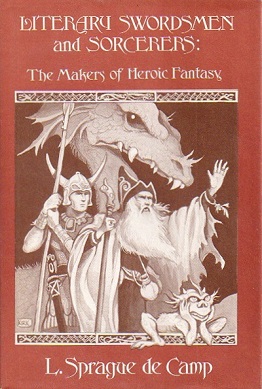
Literary Swordsmen and Sorcerers: The Makers of Heroic Fantasy is a work of collective biography on the formative authors of the heroic fantasy genre by L. Sprague de Camp (1907-2000), first published in 1976 by Arkham House in an edition of 5,431 copies. Nine chapters (2-10) are revisions from a series of ten articles, also titled "Literary Swordsmen and Sorcerers," that initially appeared in the magazine Fantastic and the fanzine Amra between 1971 and 1976. A French edition was issued in May 2010 under the title Les pionniers de la fantasy, and an ebook edition was issued in June 2014 by Gateway/Orion.
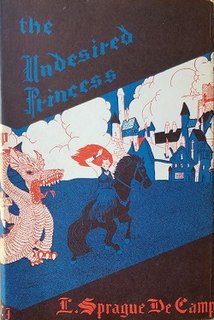
The Undesired Princess is a 51,000 word fantasy novella by American writer L. Sprague de Camp. It was first published in the fantasy magazine Unknown Worlds for February 1942. It was published in book form by Fantasy Publishing Company, Inc. in 1951. The book version also includes the 10,000 word fantasy short story "Mr. Arson", first published in Unknown for December 1941. The book was bound together with Stanley G. Weinbaum's The Dark Other in the omnibus collection Fantasy Twin by the same publisher in 1953. The title story was also published in paperback by Baen Books in 1990 together with David Drake's story The Enchanted Bunny, under the combined title The Undesired Princess & the Enchanted Bunny.

The Best of L. Sprague de Camp is a collection of writings by American science fiction and fantasy author L. Sprague de Camp, first published in hardback by Nelson Doubleday in February 1978 and in paperback by Ballantine Books in May of the same year. The book was reprinted by Ballantine in May 1986. It was reissued in trade paperback and ebook editions by Phoenix Pick in December 2014. It has also been translated into German.

Sprague de Camp's New Anthology of Science Fiction is a collection of science fiction stories by American writer L. Sprague de Camp, edited by H. J. Campbell. It was first published in both hardcover and paperback in 1953 by Panther Books.
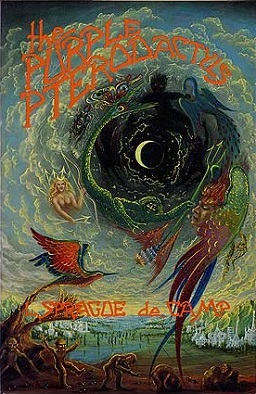
The Purple Pterodactyls is a collection of fantasy short stories by American writer L. Sprague de Camp. The collection was first published in hardcover by Phantasia Press in January, 1980, and in paperback by Ace Books in April of the same year. It has also been translated into German. An e-book edition was published by Gollancz's SF Gateway imprint on September 29, 2011 as part of a general release of de Camp's works in electronic form. The pieces were originally published between 1975 and 1979 in the magazines The Magazine of Fantasy & Science Fiction, Fantastic, Escape!, and Fantasy Crossroads.

The Reluctant Shaman and Other Fantastic Tales is a collection of short stories by American science fiction and fantasy author L. Sprague de Camp, first published in paperback by Pyramid Books in November 1970. An E-book edition was published by Gollancz's SF Gateway imprint on September 29, 2011 as part of a general release of de Camp's works in electronic form. The pieces were originally published between 1939 and 1958 in the magazines Thrilling Wonder Stories, Unknown, and Fantastic Universe. The collection has also been translated into French and German.

Divide and Rule is a 1948 collection of two science fiction novellas by American writer L. Sprague de Camp, first published in hardcover by Fantasy Press, and later reissued in paperback by Lancer Books in 1964. The collected pieces were previously published in 1939 and 1941 in the magazines Unknown and Astounding. The first stand-alone edition of the title story was published as a large-print hardcover by Thorndike Press in September 2003. An E-book edition of the title story was issued by Gollancz's SF Gateway imprint on September 29, 2011 as part of a general release of de Camp's works in electronic form.

Conan the Swordsman is a collection of seven fantasy short stories and associated pieces written by L. Sprague de Camp, Lin Carter and Björn Nyberg featuring Robert E. Howard's sword and sorcery hero Conan the Barbarian. It was first published in paperback by Bantam Books in August 1978, and reprinted in 1981. Later paperback editions were issued by Ace Books. The first hardcover edition was published by Tor Books in December 2002. The first British edition was issued by Sphere Books in 1978. The book has also been translated into Italian and French. It was later gathered together with Conan the Liberator and Conan and the Spider God into the omnibus collection Sagas of Conan.

The Incorporated Knight is a fix-up fantasy novel by American writers L. Sprague de Camp and Catherine Crook de Camp, the first book in their sequence of two Neo-Napolitanian novels. Chapters 1-5 first appeared as L. Sprague de Camp's short stories "Two Yards of Dragon", "The Coronet", "Spider Love" and "Eudoric's Unicorn" in Flashing Swords!, The Magazine of Fantasy and Science Fiction and The Year's Best Fantasy Stories in 1976-1977. The complete novel was first published in hardcover by Phantasia Press in August 1987, and in paperback by Baen Books in September 1988, with a trade paperback edition, also from Baen, following in 1991. An E-book edition was published by Gollancz's SF Gateway imprint on September 29, 2011 as part of a general release of de Camp's works in electronic form.
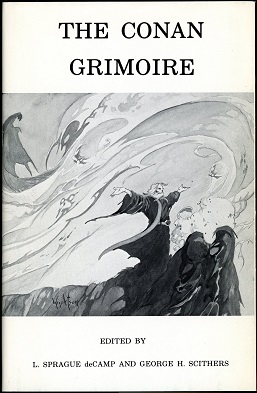
The Conan Grimoire is a 1972 collection of essays, poetry and fiction edited by L. Sprague de Camp and George H. Scithers, published in hardcover by Mirage Press. The essays were originally published as articles in Scithers' fanzine Amra. The book is a companion to Mirage’s previous two volumes of material from Amra, The Conan Reader (1968) and The Conan Swordbook (1969). Most of the material in the three volumes, together with some additional material, was later reprinted in two de Camp-edited paperback anthologies from Ace Books; The Blade of Conan (1979) and The Spell of Conan (1980).

"The Emperor's Fan" is a fantasy short story by American writer L. Sprague de Camp, the fourth of his Novarian series. It was first published in Astounding: The John W. Campbell Memorial Anthology, edited by Harry Harrison, in 1973. It has since been reprinted in other anthologies, including The Year's Best Fantasy Stories, edited by Lin Carter (1975), as well as such collections of de Camp's work as The Best of L. Sprague de Camp (1978) and Footprints on Sand (1981). It has also been translated into German.
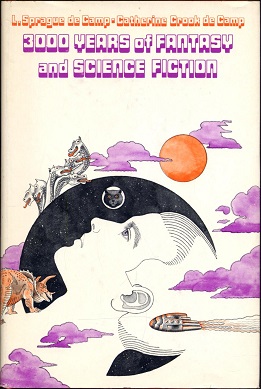
3000 Years of Fantasy and Science Fiction is an anthology of fantasy and science fiction short stories, edited by L. Sprague de Camp and Catherine Crook de Camp. It was first published in both hardcover and paperback by Lothrop Lee & Shepard in 1972. It was the first such anthology assembled by the de Camps, preceding their later Tales Beyond Time (1973).

"The Gem in the Tower" is a short story by American writers L. Sprague de Camp and Lin Carter, featuring the fictional sword and sorcery hero Conan the Barbarian created by Robert E. Howard. It is a rewritten version of "Black Moonlight", an earlier story by Carter alone featuring his own sword and sorcery character Thongor. The Conan version was first published by Bantam Books in the paperback collection Conan the Swordsman in August 1978, and was reprinted in the anthology The Year's Best Fantasy Stories: 5 and later editions of Conan the Swordsman. The collection was later gathered together with Conan the Liberator and Conan and the Spider God into the omnibus collection Sagas of Conan. The story has also been translated into Italian and French.

"The Gnarly Man" is a science fiction story by American writer L. Sprague de Camp, about an apparently immortal Neanderthal Man surviving into the present day.

"Divide and Rule" is a science fiction novella by American writer L. Sprague de Camp. It was first published as a serial in the magazine Unknown from April to May, 1939 and first appeared in book form in de Camp's collection Divide and Rule. The story was revised for book publication. The first stand-alone book edition of the story was published as a large-print hardcover by Thorndike Press in September 2003. An E-book edition of the story was issued by Gollancz's SF Gateway imprint on September 29, 2011 as part of a general release of de Camp's works in electronic form.
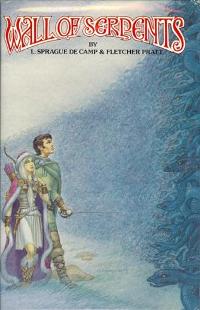
The Wall of Serpents is a fantasy novella by American science fiction and fantasy authors L. Sprague de Camp and Fletcher Pratt. The fourth story in their Harold Shea series, it was first published in the June 1953 issue of the fantasy pulp magazine Fantasy Fiction. It first appeared in book form, together with its sequel, "The Green Magician", in the collection Wall of Serpents, issued in hardcover by Avalon Books in 1960; the book has been reissued by a number of other publishers since. It has also been reprinted in various anthologies and collections, including Great Short Novels of Adult Fantasy I (1972), The Complete Compleat Enchanter (1989), and The Mathematics of Magic: The Enchanter Stories of L. Sprague de Camp and Fletcher Pratt (2007). It has been translated into Italian and German.

We Are All Legends is a collection of fantasy short stories written by Darrell Schweitzer featuring his sword and sorcery hero Sir Julian. The book was edited by Hank Stine and illustrated by Stephen Fabian, and features an introduction by L. Sprague de Camp. It was first published as a trade paperback by The Donning Company in 1981. It was reprinted by Starmount House in 1988, Borgo Press in 1989 and Wildside Press in 1999.

"The Merman" is a science fiction story by American writer L. Sprague de Camp, based on the concept of human biological engineering. It was first published in the magazine Astounding Science-Fiction for December, 1938. It first appeared in book form in the collection The Wheels of If and Other Science Fiction ; it later appeared in the anthology Science Fiction of the Thirties and the collection The Best of L. Sprague de Camp. The story has been translated into German

"The Hardwood Pile" is a contemporary fantasy story by American writer L. Sprague de Camp. It was first published in the magazine Unknown for September, 1940. It first appeared in book form in the collection The Reluctant Shaman and Other Fantastic Tales ; it later appeared in the collection The Best of L. Sprague de Camp, and the anthology Bestiary! The story has been translated into French and German.

Mermaids! is a themed anthology of fantasy short works edited by American writers Jack Dann and Gardner Dozois. It was first published in paperback by Ace Books in January 1986. It was reissued as an ebook by Baen Books in July 2013.



















